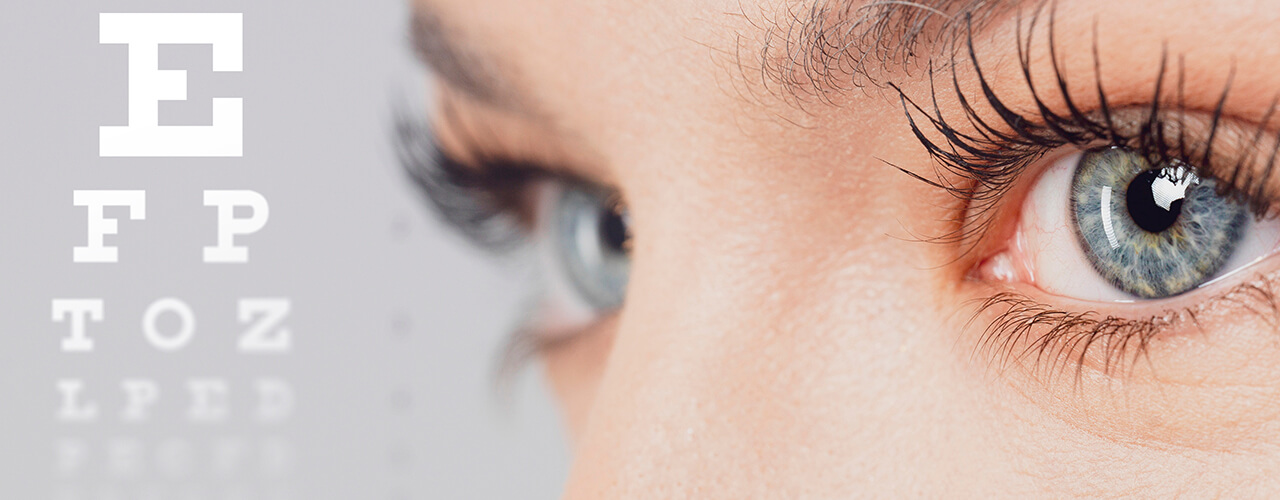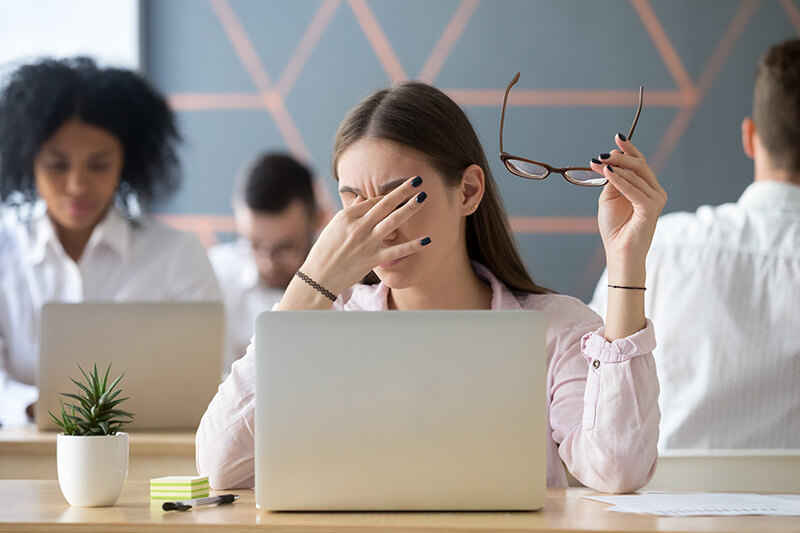If you spend your time staring at a screen, it’s important to keep moving and keep your eyes healthy in the office.
But it’s also easy to forget to look after them if you’re busy and snowed under at work. So, here are seven tips to help you reduce strain on your eyesight and keep your eyes healthy in the office:
1. Blink regularly
The average person apparently blinks up to 18 times a minute. But when you work at a screen, your blink rate can reduce to half that amount. As a result, your eyes become dry and irritated.
It may sound like an odd tip but you need to get in the habit of consciously blinking regularly. For example, you could make sure you blink every time you open an email or start a new paragraph when reading a document.
2. Sort out your screen
If you spend a lot of time at your desk, make sure it’s set up right to reduce strain on your eyes. Your screen needs to be the appropriate distance away and in the correct position for your eye line.
The College of Optometrists recommends you position your computer screen between 40 and 76 centimeters, or 16 – 30 inches, from your eyes, that the top of the screen lies in line, or slightly below, your eyes and that it’s tilted at a 10- to 20-degree angle.
Also, make sure your screen uses a high resolution and suitable font size that’s easy to read to reduce any additional strain. Finally, check the brightness levels on the screen are appropriate for the lighting levels in your office.
3. Check your light levels
The right lighting level is important to reduce eye strain. Make sure your room is well lit, preferably with as much natural light as possible.
You should also ensure that there are no distracting reflections on your screen. An anti-glare cover can help reduce glare and block out any harmful light rays reflecting from the screen.
4. Take regular breaks and exercise your eyes
Try to take regular breaks away from your desk. You may want to try to follow the 20-20-20 rule, which is where you look at something 20 feet away for 20 seconds, every 20 minutes.
You may also want to try this simple exercise for your eyes. Grab a pen and hold it at arm’s length. Bring it closer towards you and maintain your focus on the tip of the pen. Then, gradually move it away. All this time, keep focusing on the tip.
Alternatively, you could just roll your eyes clockwise and counterclockwise every now and then to loosen up the muscles in your eyes.
5. Keep an eye on the heating and air conditioning levels
Most offices use heating or air conditioning systems to maintain the right temperature. Not only are these units often the source of many a workplace dispute, they also tend to be on all day long and, as a result, could dry out your eyes.
You may not be in a position to turn off or alter your heating or air conditioning levels. So, you may want to try some eye drops to help reintroduce moisture into your eyes and counter the effects of dryness. If you don’t like using drops, then you could try an eye mist, which is a hydrating spray that doesn’t need to go directly into your eye.
6. Round up some healthy snacks
Try to source a range of healthy office snacks packed with the right vitamins and minerals to help your eyes stay healthy now and in the years ahead.
Most fruits and vegetables contain vitamins A and C to keep your eyes healthy. Leafy greens are also loaded with antioxidants, orange foodstuffs, such as carrots, yams and sweet potatoes, are packed with beta-carotene and fish is also rich in Omega 3 fats to protect against the onset of age-related vision loss and macular degeneration.
7. Get regular eye checks
Regular eye checks are vital to keep your eyes healthy and to detect many serious health conditions. For office workers, they can also make sure you’re using the right prescription as your eyesight invariably changes over the years.
If you’re staring at a screen and have the wrong prescription, you could suffer from blurred vision, headaches or even experience vertigo or nausea.
Also, if you wear contact lenses, then you may want to consider switching to a brand with a high water content or one that’s designed for longer periods of wear to make you more comfortable during the working day.
In conclusion, you need to keep your eyes healthy in the office and outside your 9 to 5. Protecting your eyes is a 24/7 job that can help you stay productive and healthy in the years ahead.










